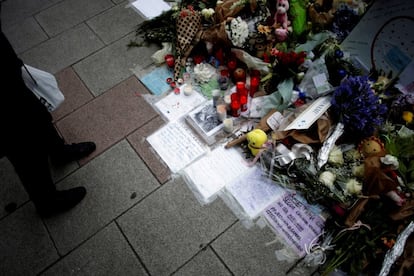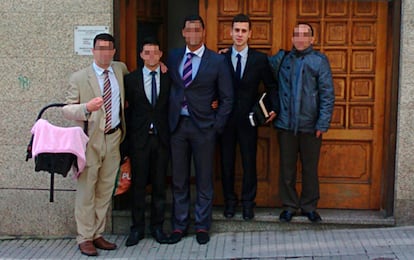Spanish police arrest fourth suspect in fatal beating of Samuel Luiz
Investigators are probing claims of a homophobic motive behind the killing, which sparked protests by LGBTQ+ groups. The victim has been described as a kind and spiritual young man who loved to help others

Spanish police have arrested a fourth individual in connection with the deadly beating of a young man by a group of at least seven people in the northwestern city of A Coruña last Saturday. The suspect is a man in his early twenties who is friends with the three people – two men and a woman – who were arrested over the brutal killing of Samuel Luiz, 24, outside a nightclub in the Galician city. The latest suspect is facing charges of homicide and for taking the victim’s phone.
Police sources have insisted that the trigger was a misunderstanding over a cellphone: Luiz was on a video call but his assailants believed that he was recording them. One attacker punched him in the face, then went to get six friends and the group continued to beat him until he dropped to the ground 150 meters down the street. Luiz later died in hospital.
Only one person came to his aid: Ibrahima Shakur, a Senegalese citizen who has provided testimony to the police. Shakur declined to offer details so as not to interfere with the investigation, but explained why he decided to step in: “I don’t like violence. This could have happened to anyone. If it had been me, and nobody helped, I could also have died.”

A friend of the victim said that the attackers – who did not know Luiz and had never been in contact with him before that moment – used homophobic slurs against the young man, who was homosexual. According to this friend, Lina, who was with Samuel at the time of the attack, the assailants repeatedly used the term “maricón” (faggot). This prompted widespread street protests by LGBTQ+ groups across Spain in the days after the attack, and led to public statements by Spanish ministers against hate crimes.
Although Luiz has become a symbol of the fight against homophobia in Spain, his father has expressed his discomfort with this. Just hours after the attack, he made a public call for the murder of his son not to be used as a “flag” and recommended that protesters donate food to the Red Cross. “I know that would have made my son happy,” he said. Close friends of the victim told this newspaper that Luiz did not conceal his sexual orientation and that his family knew about it. But his father has stated that the family had never talked openly about it.
A life spent helping others

Samuel Luiz, a nursing assistant, had been an active member of his religious community. He played the flute from the age of 15 at the pentecostal church that his family attended, and was also a spiritual leader for a group of children at the Christian Congregation, an evangelical movement founded in Chicago in the early 1900s.
Luiz studied the Bible and had embraced the faith through his father Maxsoud Luiz, a native of Brazil who works at Zara’s logistics center in Arteixo (A Coruña). Maxsoud also serves as a dean at the congregation, which meets on Thursdays and Sundays. Samuel “was always with him,” according to an Arteixo city spokesperson. His mother Lolita Muñiz is a native of Borroa, outside A Coruña. The couple met in Galicia and later moved to Brazil, then returned after the birth of their child, who they named after the prophet Samuel.
Besides his work as a nursing assistant at a senior home run by the Padre Rubinos Foundation, Samuel also volunteered with the Red Cross and studied at home in the afternoons. He was just one year away from becoming a dental technician.
“Devastated parents”
“Whether he was homosexual is not something we knew anything about, nor does it matter. If the young man stood out for something, it was for how studious, kind and polite he was,” said Orlando Bello, president of the neighborhood association San Xosé Obreiro de Meicende, where the family lives. “He arrived with his parents from Brazil at just 14 months of age, went to school here... he was the only child of Lolita and Maxsoud. I don’t know if life will have any more meaning for those poor parents, they are utterly devastated.”
Jefferton Ferreira, a family friend and a member of the Christian Congregation, said that Samuel “liked to take care of elderly and sick people. He always had a sweet look or an act of kindness ready for others.” But what he will remember the most about Samuel is his love of music. “He was a quiet young man, but every time he spoke he said important things.” His loss, he said, leaves “a hole” in the congregation.
Ferreira also lamented that very little is being said about Samuel’s remarkable spirituality and spirit of solidarity, and that the conversation instead revolves around the fact that he was gay. “If he had a sexual orientation, that’s a personal thing and it’s fine. But his personality went way beyond that.”
English version by Susana Urra.
Tu suscripción se está usando en otro dispositivo
¿Quieres añadir otro usuario a tu suscripción?
Si continúas leyendo en este dispositivo, no se podrá leer en el otro.
FlechaTu suscripción se está usando en otro dispositivo y solo puedes acceder a EL PAÍS desde un dispositivo a la vez.
Si quieres compartir tu cuenta, cambia tu suscripción a la modalidad Premium, así podrás añadir otro usuario. Cada uno accederá con su propia cuenta de email, lo que os permitirá personalizar vuestra experiencia en EL PAÍS.
¿Tienes una suscripción de empresa? Accede aquí para contratar más cuentas.
En el caso de no saber quién está usando tu cuenta, te recomendamos cambiar tu contraseña aquí.
Si decides continuar compartiendo tu cuenta, este mensaje se mostrará en tu dispositivo y en el de la otra persona que está usando tu cuenta de forma indefinida, afectando a tu experiencia de lectura. Puedes consultar aquí los términos y condiciones de la suscripción digital.








































